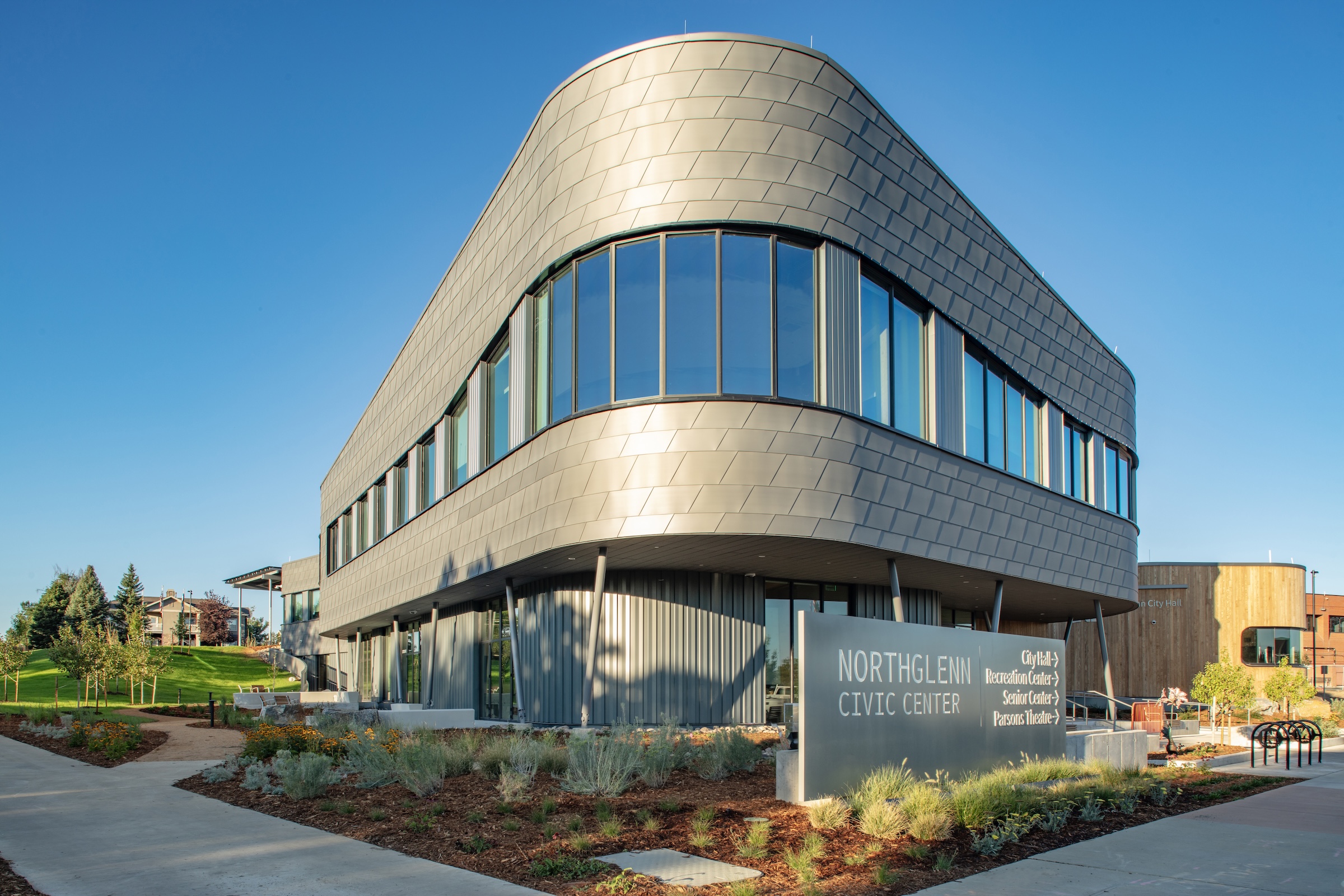Northglenn, Colo., a Denver suburb, has opened the new Northglenn City Hall—a net zero, fully electric building with a mass timber structure. The 32,600-sf, $33.7 million building houses 60 city staffers.
Designed by Anderson Mason Dale Architects, Northglenn City Hall is set to become the first municipal building in Colorado, and one of the first in the country, to achieve the Core certification: a green building rating system overseen by the International Living Future Institute.
The project boasts numerous sustainability features. Running entirely on electricity, Northglenn City Hall features 476 solar panels that are expected to generate at least as much energy as the building consumes annually. There are nine EV-charging stations, with eight more future-ready spots.
While the building’s timber structure reduces embodied carbon by 41%, about one-fifth of the building materials were sourced within 310 miles, helping to reduce CO2 emissions from transportation and shipping. In addition, 80% of construction waste was diverted from landfill.
As a result of the project’s emphasis on biophilic design, four-fifths of occupants have views of the outdoors and daylighting. Native plants reduce water use by over 70% compared to traditional landscaping, and the irrigation relies completely on non-potable water collected from rain and snow.
The project team deployed universal design principles to ensure individuals of all abilities feel comfortable and welcome in City Hall. The team also prioritized products with Declare labels, which Living Future describes as “a nutrition label for building products” that helps identify healthy materials and avoid harmful chemicals.
Northglenn City Hall’s community rooms can be reserved for public use, and its entry lobby, which showcases public art installations, can serve as a pre-function space for community events.
On the building team:
Design architect and architect of record: Anderson Mason Dale Architects
MEP engineer: The Ballard Group
Structural engineer: KL&A Engineers & Builders
General contractor: FCI Constructors
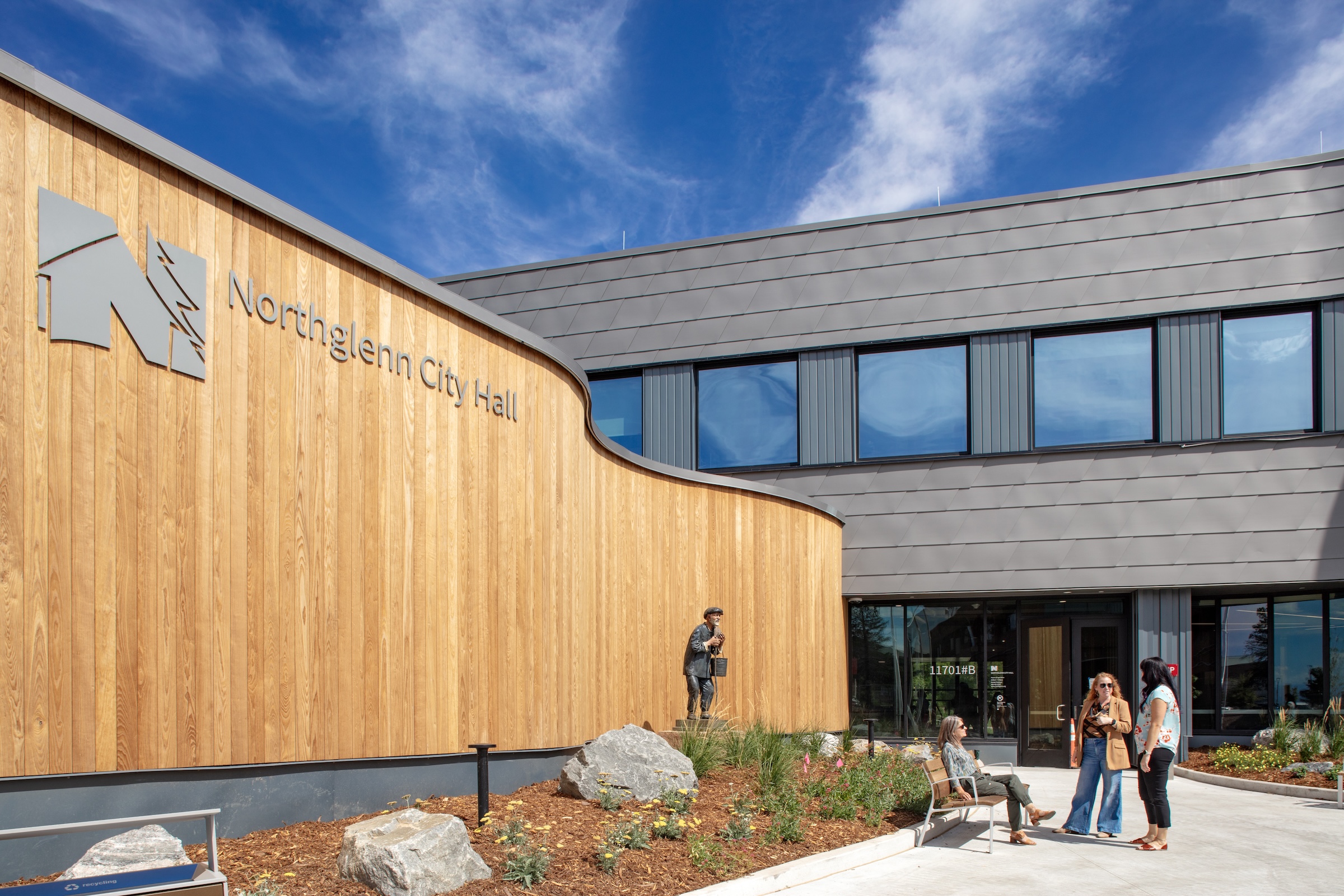
Here are additional facts about Northglenn City Hall:
- First CORE Certification: The building is set to become the first CORE-certified municipal building in the State and one of the first in the country.
- CORE Certification: Overseen by the International Living Future Institute, CORE is a green building rating system similar in ambition to LEED Platinum but emphasizes actual building performance over a checklist approach.
- Sustainable Materials: 20% of materials were sourced within 310 miles. The farthest-traveled material is the All-Wood Mass Timber Structure, from Quebec, Canada, saving 50% in embodied carbon.
- Material Transparency: Many products used “declare labels,” showing they are free from harmful chemicals.
- Embodied Carbon Savings: The carbon savings is equivalent to the carbon of 621 acres of forest for a year, or about 30 Northglenn Civic Center Campuses.
- Solar Power: The building features 476 solar panels generating 195 KW annually.
- Net-Zero Energy: It runs entirely on electricity with no natural gas, and the solar panels are expected to produce as much or more energy than the building consumes annually.
- High Efficiency: The exterior is highly efficient, with double-paned low-e coated glass and an R-Value of R-20.
- Sustainable Materials: The exterior uses Zinc and Thermally Modified Wood, which are natural, durable, and processed without harmful chemicals.
- Zero Fertilizers/Pesticides: The landscaping uses no petrochemical fertilizers or pesticides.
- EV Charging: Nine EV charging stations are installed with eight additional future-ready spots.
- Non-Potable Water: Irrigation uses 100% non-potable water collected from rain and snow.
- Water-Efficient Landscaping: Native and xeric plants reduce water use by over 70% compared to traditional landscapes.
- Nature Integration: The design incorporates natural elements to improve wellbeing, reflecting research on the health benefits of exposure to nature.
- Funding: The $33.7M for City Hall was in-hand before construction. The funding was generated by the .5% sales tax and the 4% Special Marijuana Tax, both of which can only be used for capital projects.
- City Services: The 60 city staff in the building provide services such as utility billing, permits and passports. Departments housed in City Hall include City Council, City Manager, City Clerk, Finance, Planning, Building, Economic Development, Human Resources, Parks/Rec/Culture Administration and Communications (which includes events and engagement).
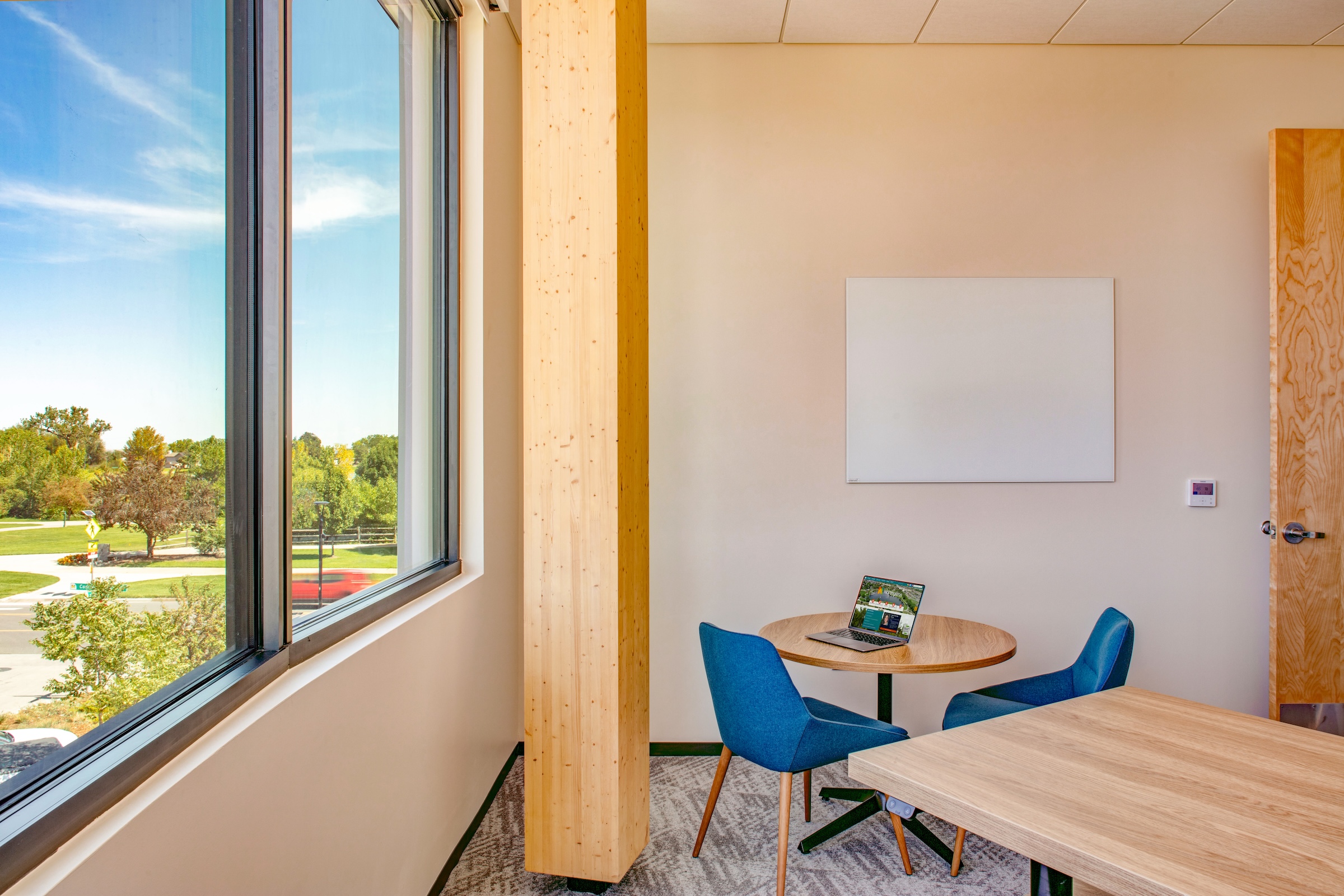
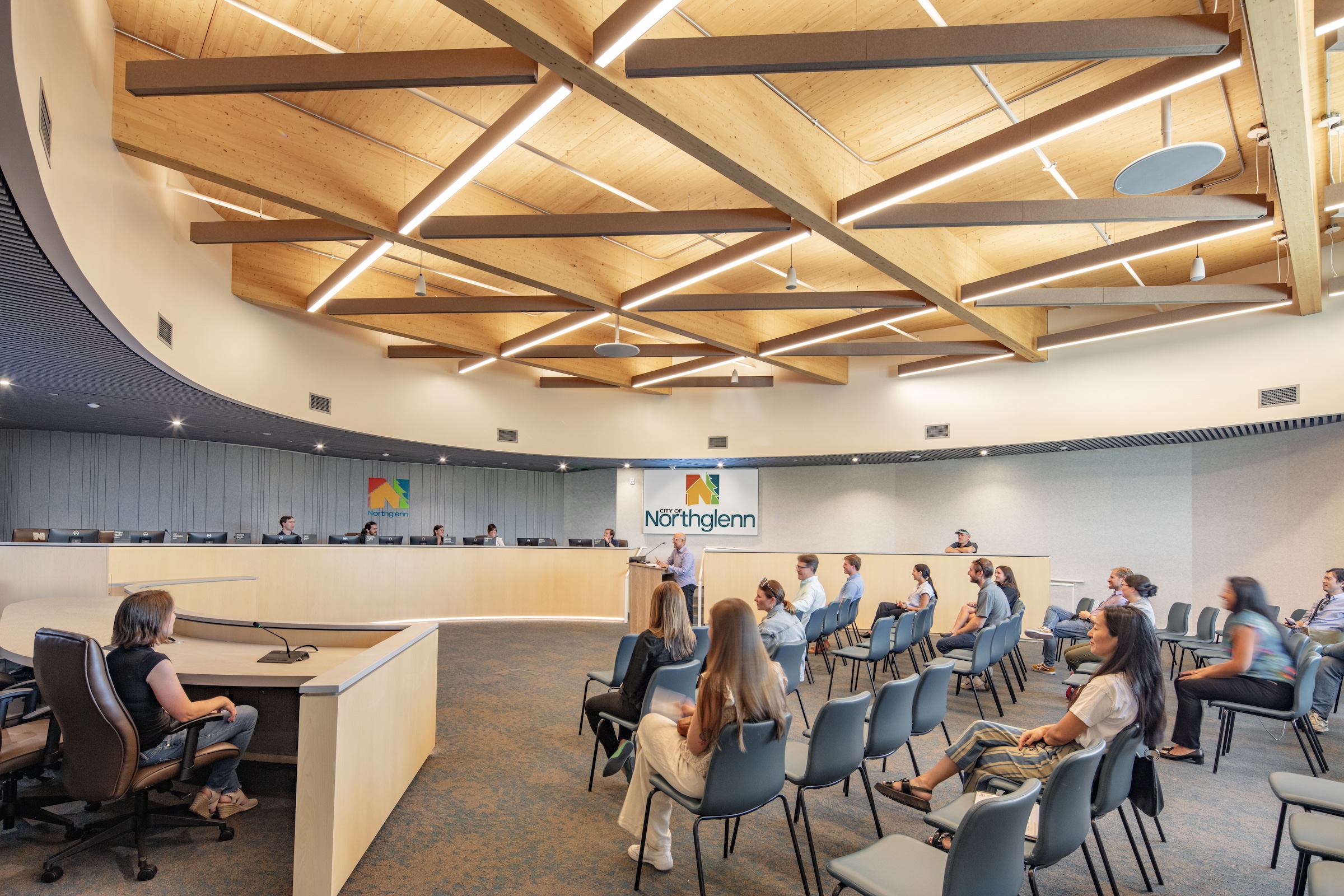
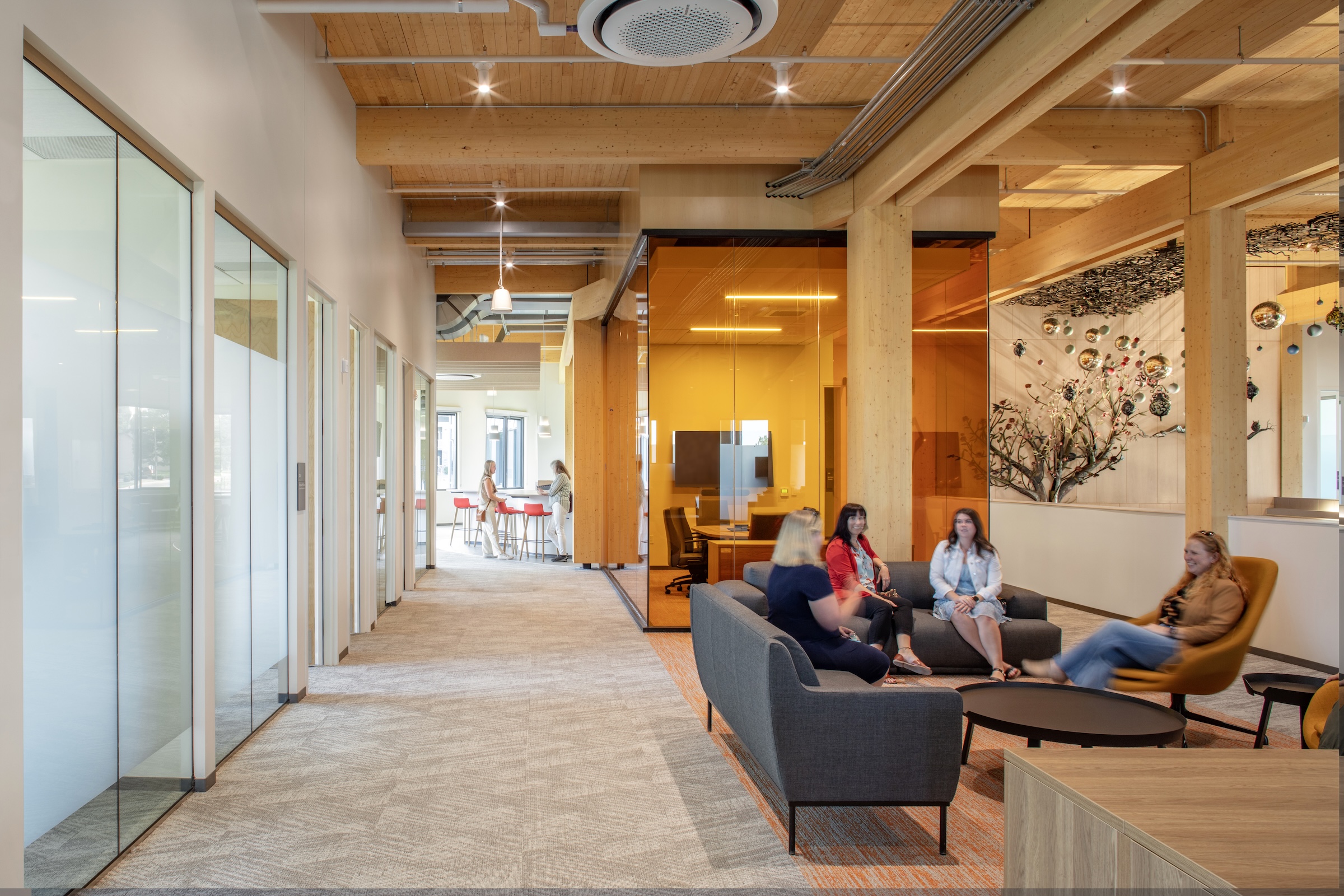
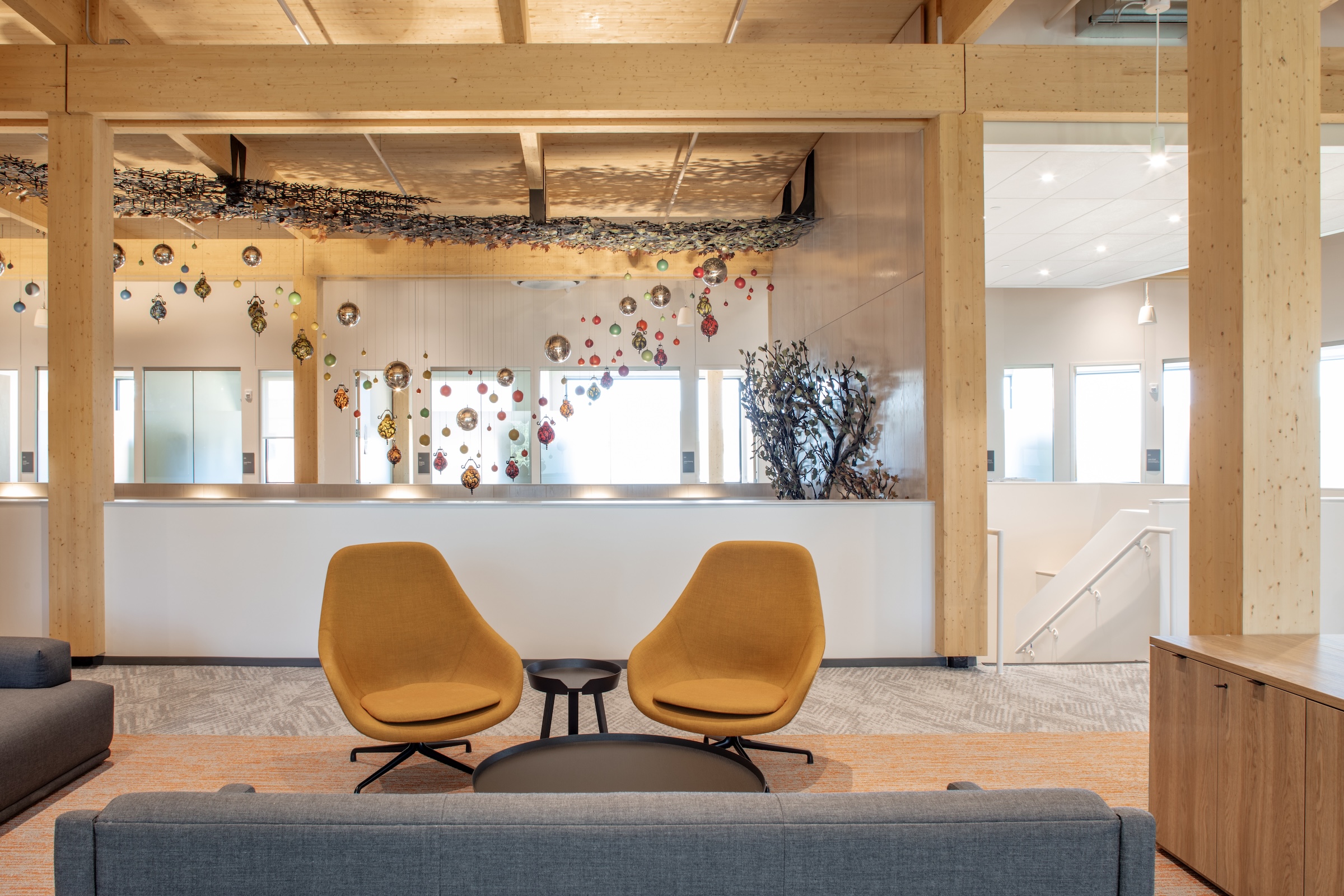
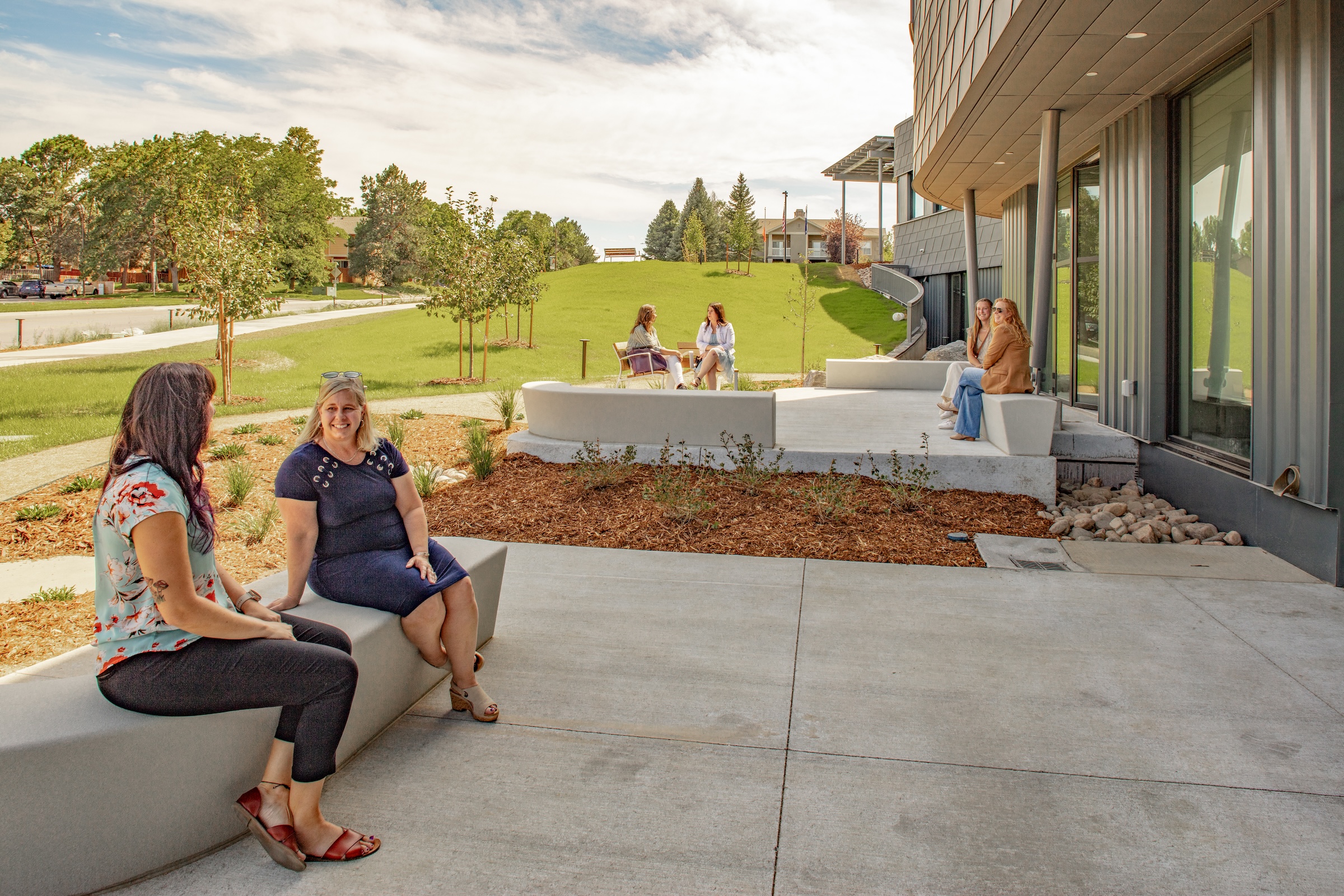
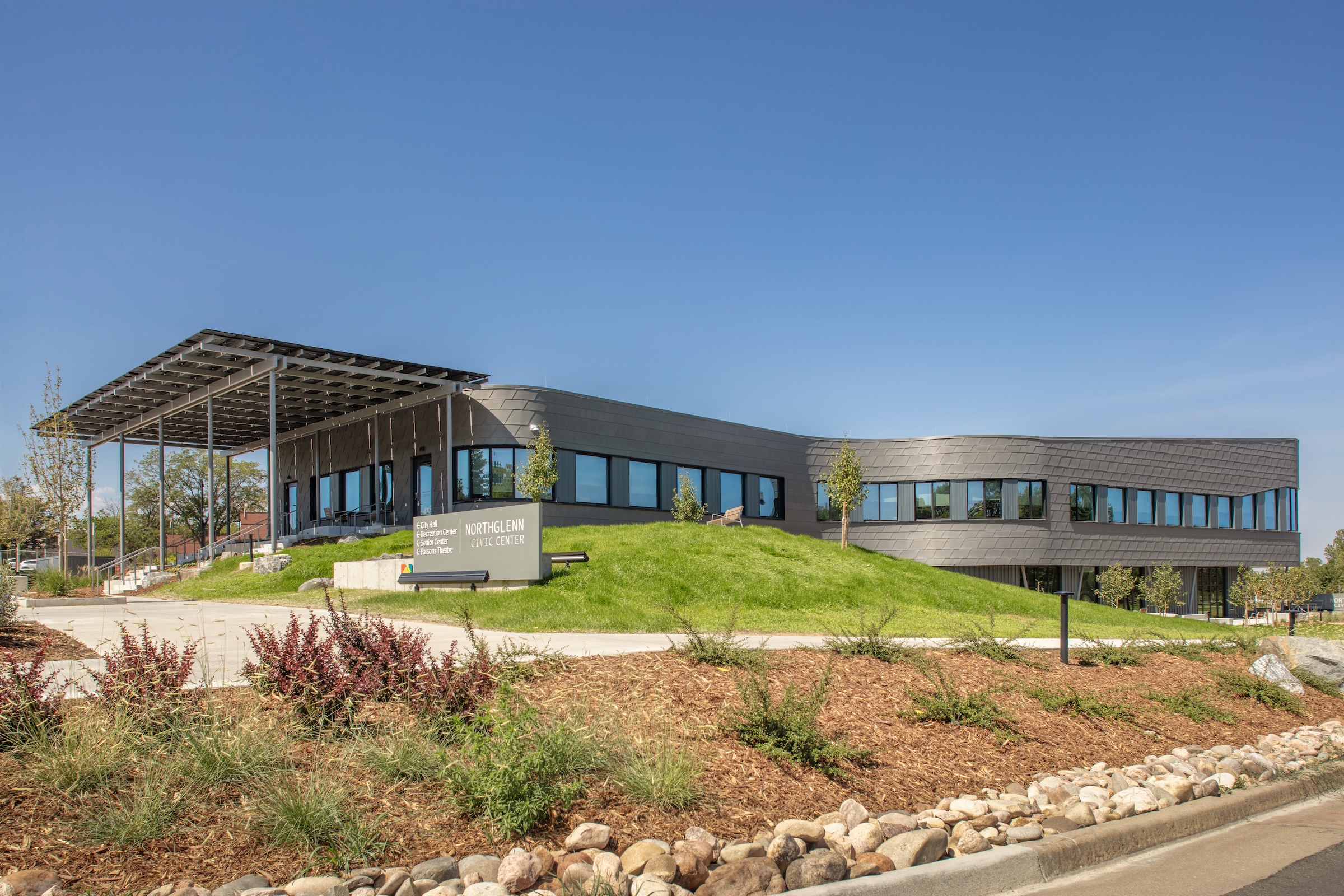
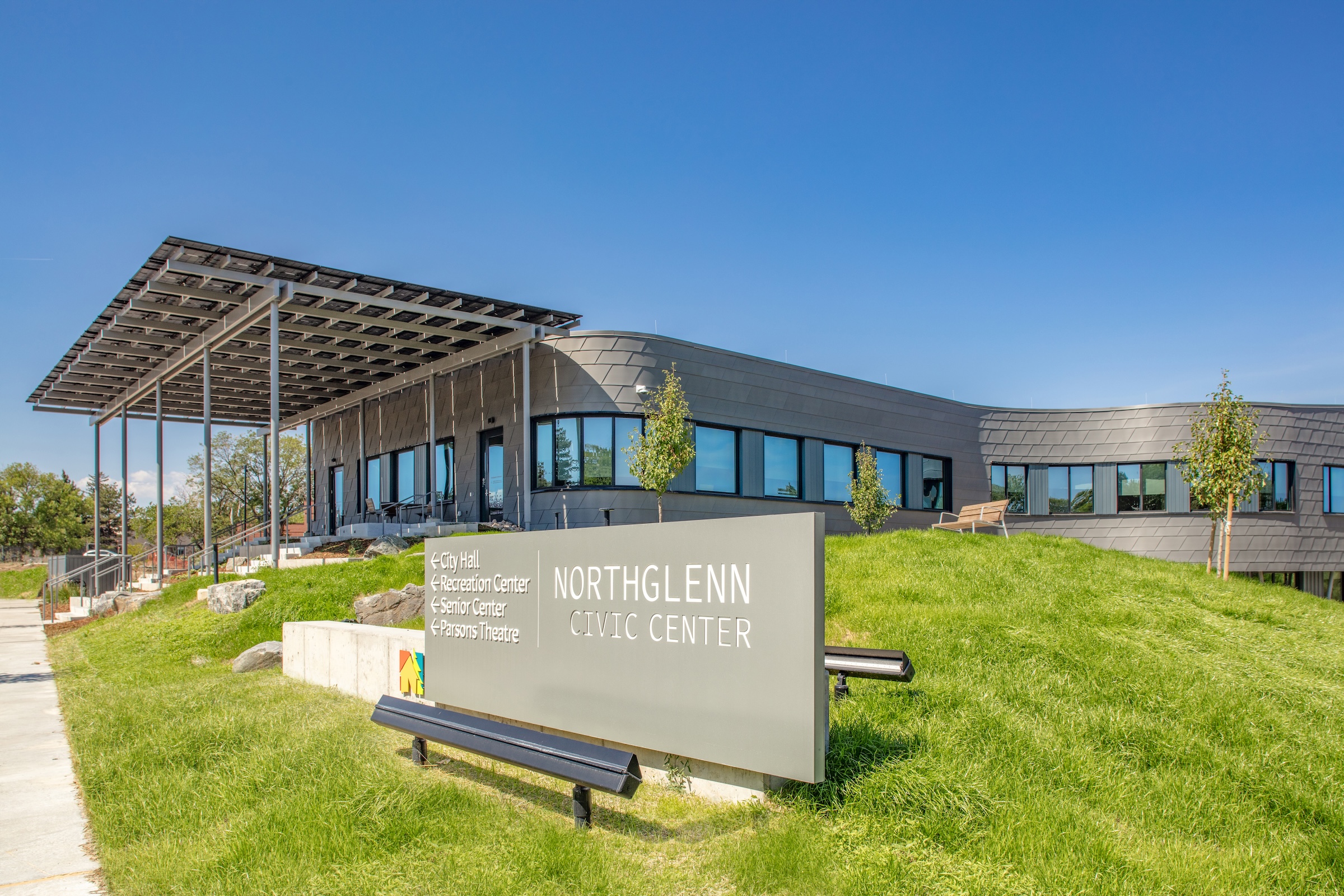
Related Stories
| Mar 1, 2011
USGBC's new LEED Interpretations similar to old precedent-setting CIRs
This week the USGBC launched its long-awaited LEED Interpretations process and database. LEED Interpretations are like project-specific Credit Interpretation Rulings, but unlike those CIRs, they can be applied to multiple projects. LEED project teams with a unique situation or a question not answered by existing LEED resources have had access to CIRs since 2009, but those CIRs have been limited. With the launch of LEED Interpretations, the USGBC hopes to broaden its scope.
| Feb 25, 2011
Denver excelling in LEED green building development
The mile high city has a decidedly green tinge. The U.S. Green Building Council (USGBC) today noted that nearly 30 projects in Denver have achieved LEED green building certification since 2010 and two of these developments achieved LEED’s highest rating, Platinum.
| Feb 25, 2011
Procter & Gamble will pursue LEED for all new sites globally
Procter & Gamble will pursue LEED certification for all new sites. P&G's Taicang plant in China - which is breaking ground today - is the first P&G manufacturing site to pursue LEED certification, with several additional new P&G sites currently working toward the same distinction globally.
| Feb 24, 2011
Perkins+Will designs 100 LEED Certified buildings
Perkins+Will announced the Leadership in Energy and Environmental Design (LEED) certification of its 100th sustainable building, marking a key milestone for the firm and for the sustainable design industry. The Vancouver-based Dockside Green Phase Two Balance project marks the firm’s 100th LEED certified building and is tied for the highest scoring LEED building worldwide with its sister project, Dockside Green Phase One.
| Feb 24, 2011
New reports chart path to net-zero-energy commercial buildings
Two new reports from the Zero Energy Commercial Buildings Consortium (CBC) on achieving net-zero-energy use in commercial buildings say that high levels of energy efficiency are the first, largest, and most important step on the way to net-zero.
| Feb 23, 2011
Financial outlook for green commercial properties is promising
Leanne Tobias, founder and managing principal of Malachite LLC, an advisory firm that specializes in the development, leasing, management, financing, and certification of sustainable or green real estate on a global basis, writes about new government policy proposals that have her cheering—and one that makes her gravely concerned.
| Feb 23, 2011
Unprecedented green building dispute could cost developer $122.3 Million
A massive 4.5 million-sf expansion of the Carousel Center shopping complex in Syracuse, N.Y., a project called Destiny USA, allegedly failed to incorporate green building components that developers had promised the federal government—including LEED certification. As a result, the project could lose its tax-exempt status, which reportedly saved developer The Pyramid Cos. $120 million, and the firm could be penalized $2.3 million by the IRS.
| Feb 23, 2011
Green building on the chopping block in House spending measure
Bryan Howard, Legislative Director of the U.S. Green Building Council, blogs about proposed GOP budget cuts that could impact green building in the commercial sector.
| Feb 22, 2011
LEED Volume Program celebrates its 500th certified Pilot Project
More than 500 building projects have certified through the LEED Volume Program since the pilot launched in 2006, according to the U.S. Green Building Council. The LEED Volume Program streamlines the certification process for high-volume property owners and managers, from commercial real estate firms, national retailers and hospitality providers, to local, state and federal governments.


